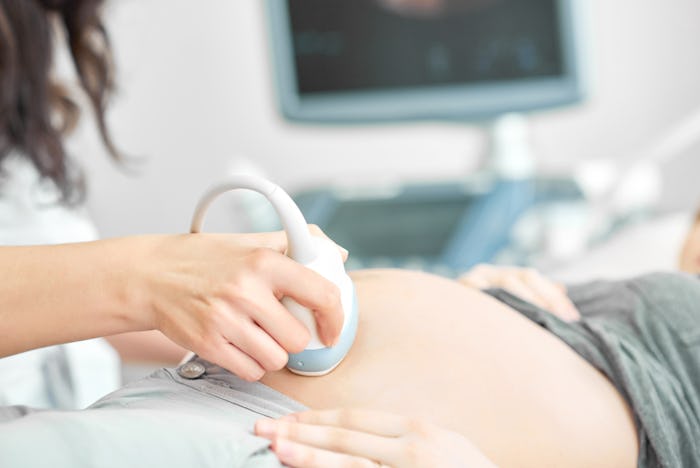Life

Here's Why You Shouldn't Worry About How Many Ultrasounds Your Doctor Recommends
When Tom Cruise purchased an ultrasound machine for his now ex-wife Katie Holmes to monitor the progress of her pregnancy, doctors were less than enthused. Yes, similar to America's feelings of watching Cruise flail about on Oprah's couch, proclaiming his love for Holmes. The reason, healthcare providers said, is that ultrasounds are not just "for fun" and should be performed by trained technicians who can not only guarantee the machine's safety, but monitor the length of time it is used. But should the everyday woman be wondering, "How do I know if my doctor is doing too many ultrasounds?" Is there such a thing as too many?
Dr. Allison Hill, OB-GYN and author of Your Pregnancy, Your Way, tells Romper in an email interview that, while healthcare providers vary, there are some general rules of thumb when it comes to ultrasound frequency. "During pregnancy, most women receive an ultrasound in the first trimester to confirm the gestational age and another one at 20 weeks, usually by a perinatologist, to look for birth defects," she says. "98 percent of mothers receive at least one ultrasound, 70 percent have three or more, and 23 percent have six or more."
The mamas-to-be that fall in the higher percentile of ultrasounds are typically those who have high-risk pregnancies. That means moms-to-be with chronic conditions like type 2 diabetes, high blood pressure, lupus, or growth restricted fetuses might require more frequent scanning, according to What To Expect.
"In general, most OB-GYNs limit the use of ultrasound unless it is indicated," Dr. Jaime Knopman and Dr. Sheeva Talebian, co-founders of TrulyMD and OB-GYNs at New York's Colorado Center for Reproductive Medicine, tell Romper in an email interview. "In most cases we use it most frequently at the bookends of pregnancy — the start to document viability and the end to confirm fetal positioning and well being."
Hill says that while multiple ultrasounds may cause maternal fear related to the health of a growing baby, it's important to note that "the safety of ultrasounds has been well established. A review of over 50 medical studies shows that ultrasounds do not pose any danger to moms or fetuses" she says. "They do not cause birth defects, childhood developmental or intellectual problems, or cancer." Hill says that ultrasound, which has been used for medical purposes since the 1950s, also does not contain radiation like that found in X-rays or CT scans.
Dr. Sherry Ross, an OB-GYN and women’s health expert at Providence Saint John’s Health Center in Santa Monica, California, agrees, adding that "pregnant women can take a sigh of relief knowing that there is no evidence showing that ultrasound is harmful to a growing baby at any stage of pregnancy."
Ross tells Romper in an email interview that ultrasound is simply high frequency sound waves that are used throughout pregnancy to evaluate the growth and health of a fetus, as well as looking at the ovaries, placenta, and amniotic fluid. "There is no scary radiation being transmitted during ultrasound," she says.
Knopman and Talebian are quick to remind pregnant women that if they are concerned about the frequency of ultrasound, then it's important to bring it up with your doctor. "Remember this relationship is a two way street — speak up if have questions," they say. "We want you to feel comfortable during this process."
In fact, the most critical component of the patient-physician relationship is communication, says Dr. Vasiliki Moragianni, a board-certified OB-GYN and reproductive endocrinologist with Colorado Center for Reproductive Medicine in Northern Virginia. "Whenever a patient is concerned about an issue, such as pregnancy ultrasound frequency, she should feel comfortable enough to discuss it with her physician," she says, adding that, otherwise, it might be time to look for a new healthcare provider.
Yet another example of mom knows best.
Check out Romper's new video series, Romper's Doula Diaries:
Check out the entire Romper's Doula Diaries series and other videos on Facebook and the Bustle app across Apple TV, Roku, and Amazon Fire TV.